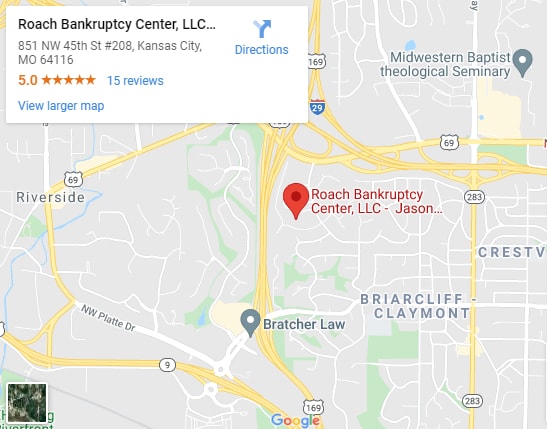Chapter 13 Bankruptcy Exemptions Lawyer
Chapter 13 bankruptcy is one of the most powerful debt-relief options that allow you to get your finances back on track and have a meaningful fresh start. Unlike other types of bankruptcy, Chapter 13 gives you a chance to repay your creditors without losing your valuable assets and property. A skilled Kansas City bankruptcy lawyer can help you determine how to protect your property when declaring bankruptcy.
At Roach Bankruptcy Center LLC, we have extensive experience handling bankruptcy cases. Our legal team is well-versed in applicable state and federal laws in this practice area. We can help stop foreclosures, repossessions, wage garnishments, and lawsuits. We strive to help our clients fully understand their legal options to make the best decisions regarding their finances and their future.
To learn more about how our law firm can assist with your bankruptcy filing, contact us now to schedule an initial consultation.
Repayment Plan During Chapter 13 Bankruptcy
 When you file for Chapter 13 bankruptcy, you are allowed to propose a repayment plan to make installments to creditors over three to five years. A Chapter 13 bankruptcy payment plan must be reviewed, approved, and overseen by a bankruptcy court before it is settled. Once the repayment plan is approved, you will make monthly payments to the bankruptcy trustee, which then pays your creditors.
When you file for Chapter 13 bankruptcy, you are allowed to propose a repayment plan to make installments to creditors over three to five years. A Chapter 13 bankruptcy payment plan must be reviewed, approved, and overseen by a bankruptcy court before it is settled. Once the repayment plan is approved, you will make monthly payments to the bankruptcy trustee, which then pays your creditors.
Your monthly payment will depend on several factors such as income, property, debts, and expenses. Bankruptcy exemptions affect the monthly payments under the Chapter 13 repayment plan. The amount that you will pay will also be based on your disposable income and your nonexempt assets. The computation of your disposable income involves calculating your monthly income and subtracting your living expenses from it. Then, you have to multiply the result by the number of months in your repayment plan, which will last for 36 to 60 months (three to five years).
Certain debts are required to be paid in full during your debt payment plan. These debts may include alimony, child support, and unpaid mortgages. On the other hand, debts that may not have to be repaid in full include credit card debts, medical bills, and personal loans. At the end of the three- or five-year repayment plan, any qualifying debt that hasn’t been paid off will be discharged. A knowledgeable bankruptcy attorney in Kansas City can help you understand how Chapter 13 bankruptcy works and how it can help you solve your debt problems.
Facing Imminent Foreclosure?
We can help save your home! Even if time is running out, we’ll find a way. Find out how by speaking with our bankruptcy lawyer in Kansas City, Missouri today.
Call Us Today! (816) 454-5555
Chapter 13 Bankruptcy Exemptions
Filing for bankruptcy does not automatically mean that you will lose everything you own. Fortunately, Kansas City bankruptcy exemptions allow you to file for bankruptcy and protect most of your property. Bankruptcy exemptions will determine how much debt you need to repay in a Chapter 13 bankruptcy plan.
The type and amount of property you can exempt varies by state. Each state has a list of exemptions that may differ in the type of property that can be protected, up to what value in equity is safe, and whether these exemptions double if two spouses are jointly filing for bankruptcy. A credible Kansas City Chapter 13 bankruptcy attorney can help you determine which exemptions apply to your financial situation.
Bankruptcy exemptions protect the net equity in the property from repaying your debts. This is because payments under the repayment plan are calculated according to the debtor’s non-exempt property value. In a Chapter 13 bankruptcy case, non-exempt equity increases the amount of money you must pay each month to your unsecured creditors. Therefore, it is important to claim all allowable bankruptcy exemptions.
It is important to note that limits apply to any property you have equity in with bankruptcy exemptions. Here are a few examples of bankruptcy exemptions in Kansas City:
Homestead Exemption
The homestead exemptions allow you to protect the home or principal residence you’re living in when you file for bankruptcy. In most cases, you can keep the entire property. In a Chapter 13 bankruptcy, you will keep your home because you will be paying your debts through a repayment plan, and you can exempt at least some of your equity. If you live on less than one acre in the city or less than 160 acres in the country, your primary residence is 100% exempt, no matter how much it’s worth.
Motor Vehicle Exemption
You can protect up to $20,000 of equity in a motor vehicle, car, truck, or SUV that you use to get to and from work. If your car is modified to support a disability, then generally the entire value of the vehicle will be considered exempt.
Personal Property
Personal property, including furniture, electronics, appliances, and most household goods, is usually exempt. A value ceiling applies to jewelry and tools of the trade, but the as-is cash value rule applies as well.
Insurance Benefits
Proceeds that an individual earns due to an existing life insurance policy are usually exempt in bankruptcy cases. However, you must file for bankruptcy one or more years after the policy goes into effect for it to be considered exempt.
Public Benefits
Many people rely heavily on public benefits. Social Security benefits, unemployment compensation, local public assistance, veterans’ benefits, and other public assistance benefits are exempt assets in bankruptcy.
Pension and Retirement Funds
Retirement accounts can be exempt up to their full value. Generally, any IRAs — including Roth IRAs — and other ERISA-recognized federal funds meant to supplement a person’s life are exempted. This exemption also applies to most pension plans such as teacher retirement plans and most tax-deferred savings accounts.
Call our Experienced Kansas City Chapter 13 Bankruptcy Lawyer Now!
Filing for Chapter 13 bankruptcy can be your best option to pay off your debts and solve your financial problems. However, it is a common misconception that you have to give up all of your property when filing for bankruptcy. On the contrary, many bankruptcy exemptions can protect your valuable assets.
Exemptions play a vital role in bankruptcy cases. Our competent Kansas City bankruptcy lawyers at Roach Bankruptcy Center LLC will work with you to ensure that your home and assets are protected under the Chapter 13 laws. Our bankruptcy law firm provides legal assistance to clients in all aspects of bankruptcy proceedings. We will help you understand your rights and represent you throughout your bankruptcy case. We will thoroughly review your case, create an affordable repayment plan, and help you regain control of your finances while protecting your valuable assets.
Contact us today and schedule your initial Chapter 13 bankruptcy consultation.
